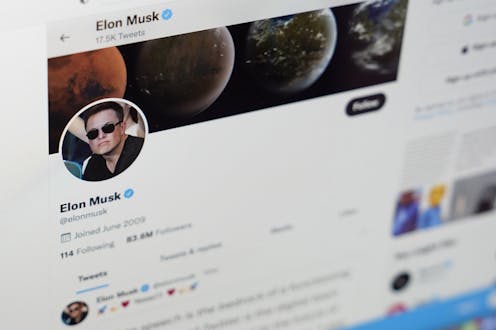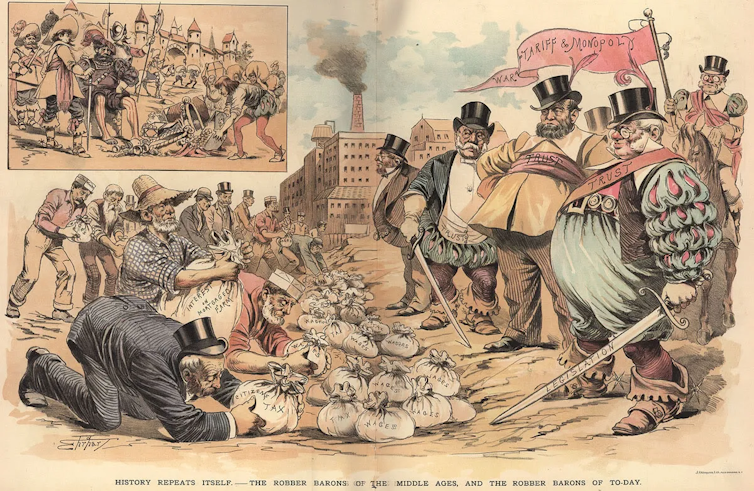
Pundits, academics and members of the public have criticized Elon Musk’s successful bid to acquire Twitter. Some Twitter users have even considered leaving the platform.
For these critics and concerned users, Musk’s bid for the social media is a risk to the freedom of expression one of the most important communication venues in the information economy.
While the trend to bypass the media has been growing in recent decades thanks to access to information and communication technologies (ICTs), Musk’s proposed takeover does not seem to make sense.
What could be the real motivation behind his takeover of Twitter?
Media barons
Musk’s plan to acquire Twitter has several historical precedents where the rich and the powerful attempted to control their own media to reach the public without other intermediaries.
In 2006, Twitter was created at Odeo Projects as a side project offering a short-messaging system (SMS) to taxi drivers. The project took off, and soon Twitter was spun off into its own entity.
In 2013, Twitter became a public company traded at the New York Stock Exchange.
In April 2022, Musk reached a deal to acquire the platform after facing initial constraints and a rebuff by the company’s board.
Capital investment in the media is not new. For example, journalist Henry Jarvis Raymond and banker George Jones founded the New York Times. Today, industrialists and entrepreneurs own most media venues, such as Amazon’s Jeff Bezos’s purchase of the Washington Post in 2013.
Much like Mark Zuckerberg’s Facebook, Musk’s Twitter becomes a natively grown media organization; that means unlike traditional media, both platforms enable sharing between users, instead of pushing content at audiences.
Robber barons
The term “robber baron” was used to describe 19th-century American industrialists and financiers in an unflattering manner. They are portrayed as greedy businessmen who seize control over industries and privatized utilities through unethical business practices.
The history of robber barons is filled with the epic and sensational depictions of business leaders such as Charles Tyson Yerkes, Cornelius Vanderbilt, Jay Gould and John D. Rockefeller by the media. Often, robber barons become the topic of discussion and gossip — critics denounce them in the media.
Early critics often drew comparisons between robber barons and medieval feudal lords who unfairly maintained control over basic necessities and resources in their societies.
Much of the criticism against Musk, Bezos and Zuckerberg — and other Silicon Valley entrepreneurs like Google founders Sergei Brin and Larry Page — is eerily reminiscent of the criticisms levelled against 19th-century robber barons.
The platforms exploited by Musk, Bezos, Zuckerberg, Brin and Page have become necessary public utilities in the information economy, and these media barons exploit people’s data for their own personal gain.
Some can perceive their wealth and influence over the media as dangerous for democracy. While democratic concerns are legitimate, another perspective may help us understand Musk’s US$44 billion purchase of Twitter.

Creative destruction
Legal scholar Tim Wu writes that the expansion and contraction of information platforms leads to disruptive innovation when several platforms compete with one another, and consolidation when emerging dominant players attempt to assert their hold over information.
Much like Italy before the First World War, Twitter is not powerful enough to challenge the powers of its day — Google, Apple, Facebook, Amazon and Microsoft. But it is too big to be ignored or swallowed by them.
Musk’s acquisition of Twitter adds the platform to his eclectic collection of disruptive industries: Tesla Motors, Neuralink, SolarCity and SpaceX. However, unlike Musk’s previous projects, which he bought either early in their development or founded, Twitter is not a disruptive technology, while the contents of its users can be. Musk may claim that he wants to disrupt news and allow for greater freedom of expression, but he did not need to purchase Twitter for that.
Musk needs direct access to users’ attention to use Twitter as the cement that can propel all of his other ventures further. Fears that Musk will make the social media platform friendly to far-right conservatives are exaggerated.
Musk needs to attract users who are innovators and early adopters to convince the masses that his ventures are worthwhile. However, far-right conservatives do not tend to be innovators or early adopters of new technologies. Rather, they tend to be part of the late majority and laggards.
Metaverses and cryptocurencies
The people who fear Musk’s hold over Twitter today are often part of the most desirable demographic promoters of new technologies seek. To understand Musk’s purchase of Twitter, one must think as he does — strategically and tactically.
Musk needs Twitter to propel the next phases of his business ventures that include cryptocurrencies. He may also be preparing to start a metaverse of his own and take on Facebook’s version by joining Twitter to the brain interfaces developed by Neuralink.
Twitter already has a rich diversity of users from various demographics, including the innovators and early adopters that make or break new information platforms. They have a stake in maintaining their presence on Twitter because of years of publishing and creating their identities on the platform. The network connections and access provided through Twitter is a benefit to many users.
If Twitter is key to the next phases of Musk’s business ventures, one of the most important tasks he has is to convince doubtful users that he is more of a benevolent ruler than a despicable robber baron. He must convince them that it is business as usual while he continues to grow the platform’s user base.
Hervé Saint-Louis receives funding from Social Sciences and Humanities Research Council (Canada).
This article was originally published on The Conversation. Read the original article.







